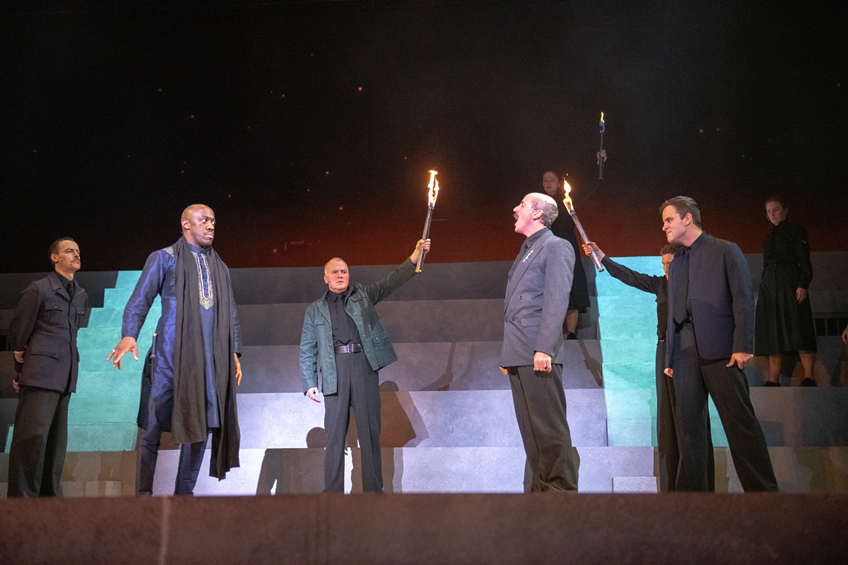The set is a miniature Greek amphitheatre. The setting doesn’t do the actors any favours. There is no scenery, no costume, only everyday modern clothes. Everybody is dressed in black. I missed the exotic colours of Venice and Cyprus where the tragedy takes place.
The actors climb up and down stairs. A chorus sit on the steps reacting physically and vocally to speeches addressed to them. Much of the action takes place in the dark and semi-dark with flares. The actors are often spotlit. Music underlines the dialogue. Claps of thunder punctuate the action. At one point, actors appear with police shields.
Clint Dyer is the first black director to direct a play at the National Theatre. The major strength of the production is its sharp pace and sharp editing. The emphasis is on racism and misogyny, rather than jealousy. He ignores the poetry.
Giles Terera, who has done so much excellent work recently does not dominate the stage in the way Othello should. He has neither stature, nobility nor exoticism. He is never a tragic figure. You would never guess the play is one of the great crimes passionels watching his performance. Terera is at his best in the great Act 3 temptation scene with Iago, which is played out with just one prop, a punchbag.

The Venetian government, who employ him to fight their wars, do not treat him with the dignity he deserves. Their racism is emphasised when they pointedly refuse to shake his outstretched hand.
Othello wrongly believes his wife is unfaithful. In Shakespeare’s text, he slaps her face in public. Here, disgustingly, he degrades her, treating her like a dog, ordering her to heel.
Rosy McEwen’s Desdemona is not a sweet innocent girl. She is a sophisticated woman and quite capable of standing tall when she is with her father and standing even taller when she is with her husband.
Paul Hilton is the most public-school Iago I have heard, no common ensign he; rather an Oswald Mosley lookalike. Iago hates Othello because Othello is black and because he has promoted an inferior soldier above him.
Interestingly, the production premiered in the week The Queen Consort hosted a major reception at Buckingham Palace to increase awareness of violence against women and girls.
Emilia (Tanya Franks), the battered and unloved wife of Iago is Shakespeare’s spokesperson for abused women. It is she who points out that men “are all but stomachs, and we are all but food. They eat us hungerly, and when we are full, they belch us”.
To learn more about Robert Tanitch and his reviews, click here to go to his website 




